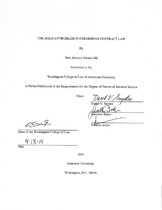Mostrar el registro sencillo del ítem
The hold-up problem in colombian contract law
| dc.contributor.advisor | N/A | |
| dc.contributor.author | Gaviria Gil, Juan Antonio | |
| dc.coverage.spatial | Seccional Medellín. Escuela de Derecho y Ciencias Políticas. Doctorado en Ciencias Jurídicas | spa |
| dc.date.accessioned | 2019-02-21T19:51:27Z | |
| dc.date.available | 2019-02-21T19:51:27Z | |
| dc.date.issued | 2014 | |
| dc.identifier.uri | http://hdl.handle.net/20.500.11912/4369 | |
| dc.description | 295 páginas | spa |
| dc.description.abstract | As its title suggests, this dissertation studies the interaction between an economic issue (the hold-up problem) and a legal system (Colombian law). For this purpose, this dissertation first defines the hold-up problem and explains its causes and possible solutions. The dissertation then analyzes how U.S. and Colombian laws deal with the hold-up problem and with its main harmful effect: the reduction of idiosyncratic investments. The U.S. law is studied here not only to facilitate the comparison of a civil law country’s approach to the hold-up problem (Colombia) with the perspective of a common law country (the United States) but also to inquire whether some of the solutions to the hold-up problem under the latter legal system might be successfully transplanted to the former one. The study of these legal systems delves into the role of both contractual and legal devices that may avoid, solve, or mitigate the hold-up problem (in general, that may prevent it). The contractual devices discussed here are no modification clauses, stipulated damages clauses, and reputation bonds. The legal devices, in turn, are legal rules entitling courts either to annul modifications in hold-up situations on grounds such as economic duress and bad-faith or to grant remedies for breach of contract. This theoretical analysis is coupled with an experiment with Colombian students testing the theories stating that penalty clauses (on one hand) and a high level of legal remedies for breach of contract (on the other) may prevent the hold-up problem. The results of this experiment failed to confirm the predictions of the theory. Based on the findings of the theoretical and experimental chapters, and before making some concluding remarks, the dissertation presents some proposals to efficiently address the hold-up problem in Colombian contract law. | spa |
| dc.format.mimetype | application/pdf | |
| dc.language.iso | eng | |
| dc.rights | Attribution-NonCommercial-NoDerivatives 4.0 International | * |
| dc.rights.uri | http://creativecommons.org/licenses/by-nc-nd/4.0/ | * |
| dc.title | The hold-up problem in colombian contract law | spa |
| dc.type | doctoralThesis | spa |
| dc.publisher.department | Escuela de Derecho y Ciencias Políticas | spa |
| dc.publisher.program | Doctorado en Ciencias Jurídicas | spa |
| dc.rights.accessRights | openAccess | spa |
| dc.type.hasVersion | publishedVersion | spa |
| dc.description.sectional | Medellín | spa |
| dc.identifier.instname | instname:Universidad Pontificia Bolivariana | spa |
| dc.identifier.reponame | reponame:Repositorio Institucional de la Universidad Pontificia Bolivariana | spa |
| dc.identifier.repourl | repourl:https://repository.unab.edu.co/ | |
| dc.description.degreename | Doctor en Ciencias jurídicas | spa |
Ficheros en el ítem
Este ítem aparece en la(s) siguiente(s) colección(ones)
-
Tesis de especialización, maestría y doctorado [1661]
Tesis de especialización, maestría y doctorado


